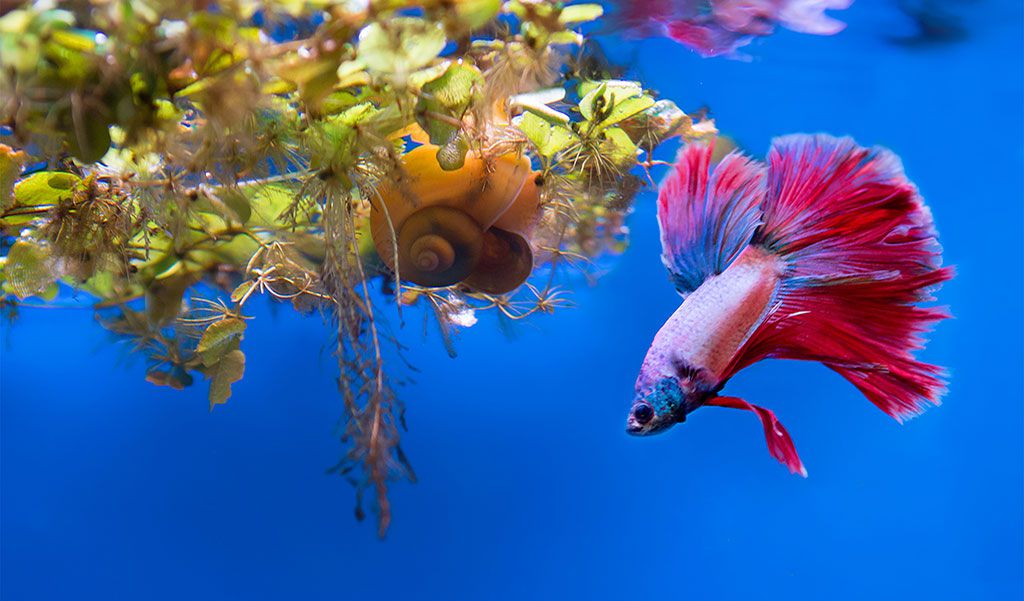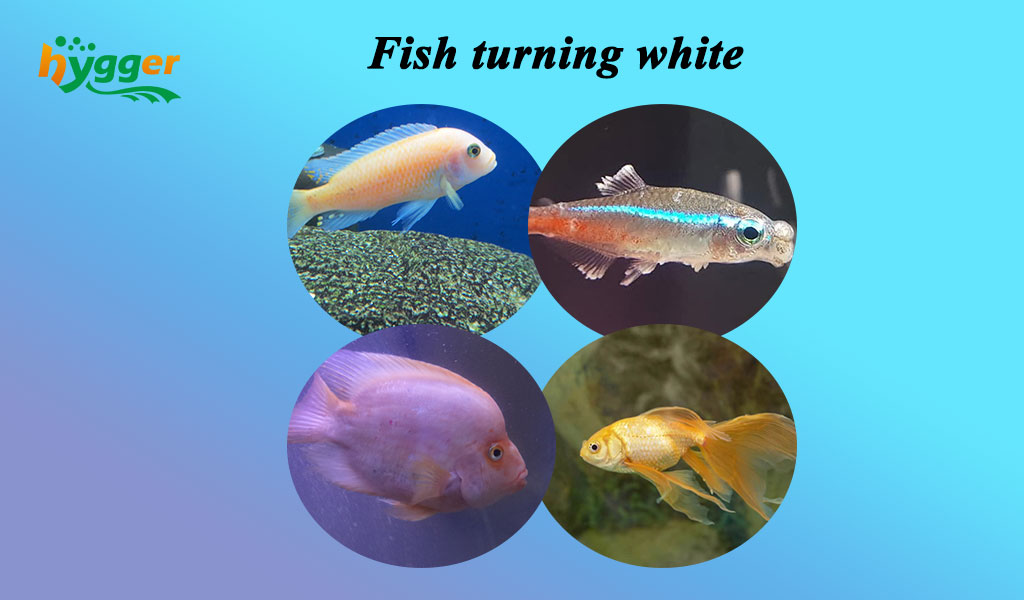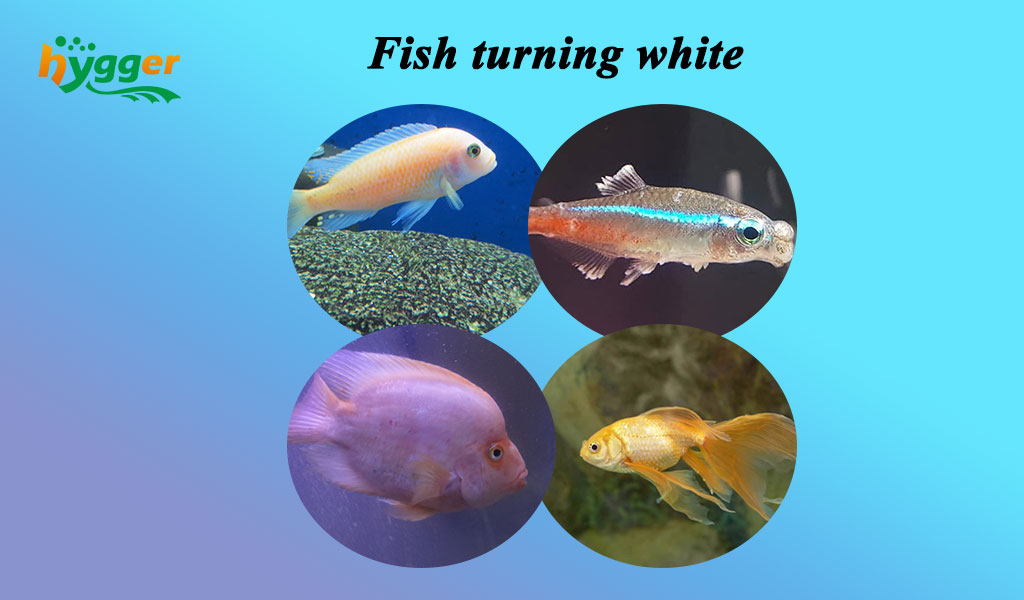Abnormal fish behavior or symptoms may be signs of bad water quality, stress, or disease. For example, fish turning white may be the result of low oxygen levels and poor water quality. In the following sections, we will give you an overview of why fish are turning white, then you can get a general understanding of fish color fading. After reading, you can know the cause and treatments of fish turning white, plus how to prevent it. Rant over, let’s dive in.
Why are aquarium fish turning white
Causes of aquarium fish turning white
Before digging into deeper cures, let’s learn why are aquarium fish turning white.
- Poor water conditions
Poor water quality or low oxygen levels in the tank would cause fish turning white. Facing oxygen deficiency in the tank, fish would stay at the bottom of the tank, lose the desired appetite, breathe hard, and gasp air on the water surface.
- Water parameters fluctuation
Rapid water changes would lead to water parameter fluctuation, which is damaging to fish.
- Stress
Stress from aggressive attacks, overcrowded, poor water quality, or frequent water changes would cause dull body color.
- Nutrition deficiency
Fish need diets rich in nutrients, vitamins, minerals, and pigments to stay brilliant. For example, insects, worms, shrimp, fruit, vegetables, etc.
- Lighting
The body color may turn white because of light deficiency or intensive light. Some fish have scale pigments, like goldfish and Koi fish, they will lose color in a tank in lack of light.
- Disease infection
Fish turning white may be the result of parasite, fungal, or bacterial infections.
Fish are prone to turn white
Aside from that, in the table below are some examples that fish would turn white, and the causes.
| Fish name | Causes of fish turning white |
| Parrot fish | 1. Improper water conditions 2. Stress 3. Spawning parrot fish 4. Disease infection (e.g. Ich or fungal infection) |
| Neon tetra | 1. Low water temperature 2. Frequent water changes 3. Stress 4. Lighting deficiency 5. Improper tank cycle 6. Incompatible tank mates 7. Disease infection |
| Cichlid fish | 1. Poor water conditions 2. Overstock in your tank 3. Nutrition deficiency 4. Injury because of fish fights 5. Parasite infection: Velvet disease |
| Goldfish | 1. Poor water conditions 2. Low water temp and oxygen level 3. Improper diet 4. Aging 5. Light deficiency 6. Genetics 7. Disease infection (e.g. White spot disease /Malawi bloat) |
Why is my betta fish turning white
Causes of betta fish turning white
- Aging
As fish become older, they may turn white. It is an aging process. You can not stop it, actually. But you can slow down the fish color fading process by ensuring a clean living environment.
- Genetics
Some bettas have genetic variations, which make the fish lose color easier. The genetic variations make bettas more susceptible to suffering from parasite or bacterial infection, leading to fish color fading.
- Stress
Stress is another reason for fish turning white. Poor water quality and incompatible tank mates are stress sources. You can keep betta fish happy by providing adequate space, great water quality, and a proper diet.
- Injury
Due to injuries, betta fish would turn white. And fish injuries may be caused by flights with tank mates, and sharp rocks or decors in the tank.
- Disease infection
Columnaris (bacterial infection), anchor worms (parasite infection), fin rot (bacterial infection), and ich (parasite infection) may pose threats to color changes among betta fish.
Cures of betta fish turning white
- Improve water quality: Change the aquarium water and test the parameters.
- Columnaris treatment: separate the infected fish, and then bathe them in the water with freshwater aquarium salt. Generally, one tablespoon of salt for five gallons of water.
- Anchor worms treatment: Bathe sick betta in potassium permanganate.
- Fin rot treatment: treat sick fish with aquarium salt, henoxyethanol, malachite green, methylene blue, or erythromycin.
- Ich treatment: Improve the water temperature to 81-86℉ lasting about 10 days. Then kill the ich with medications containing formalin and malachite green.
How to reclaim the color of faded betta fish
In general, you can reclaim the color of faded bettas by changing the living environment or adjusting their diet. Next, we will give you some tips.
- Replace the substrate
To create a better living environment, cleaning or replacing the substrate is feasible. Accordingly, gravel and sand are two great options. However, do not forget to clean the substrate regularly.
- Add aquarium light
Adding an aquarium light is beneficial to enhance bettas’ body color. Then the fish become more brilliant. A LED fish tank light is suitable for betta fish aquariums.
- Adjust fish diet
Nutrient deficiency causes bettas turning white. As a result, it is necessary to keep a varied and balanced diet. The available food includes blood worms, brine shrimp, betta pellets, betta flakes, daphnia, mosquito larvae, etc.

Preventing your fish from losing color
Prevention of fish losing color
- Check the water parameters regularly
Test the aquarium water with aquarium water test strips to check the pH level, ammonia level, nitrite level, and nitrate level, and adjust the water to the right level according to your fish’s needs.
- Monitor the water temperature
As for tropical fish, they prefer warm waters. You should monitor the water temp, and make adjustments immediately once the temp is out of the optimal range. Also, you can add an aquarium heater to maintain warm water in tanks.
- Keep a clean tank
Build a great filtration system to remove and filter fish feces, waste, and unnecessary substances.
- Fish diet
A varied and balanced diet is critically crucial. But never overfeed.
- Improve oxygen level in the tank
You can do that by changing water, improving surface agitation, reducing fish density, or adding an air pump.
- Keep sufficient lighting
It is feasible to keep 8–12 hours of lighting each day. For high-light fish, you can add a LED light to meet their light requirements.
Pointers about enhancing fish color
- Fish diet: Color-enhancing foods are helpful to improve fish color. Like, brine shrimp, mysis shrimp, scallops, and romaine lettuce.
- Lighting: Sufficient lighting can definitely enhance fish color. For instance, platyfish are fond of aquarium light with more white light.
- Water quality: Fish can live happily in tanks with water quality. Consequently, the risk of illness and disease will be relatively decreased. Plus, it reduces the threat of fish color fading.
The final word
In a word, keeping a clean tank and maintaining a comfortable living environment can decrease the risk of fish injuries and fish color fading. Additionally, it is recommended to restore fish color as soon as possible when your fish fades. Finally, thanks for your reading, and we hope this article helps.

